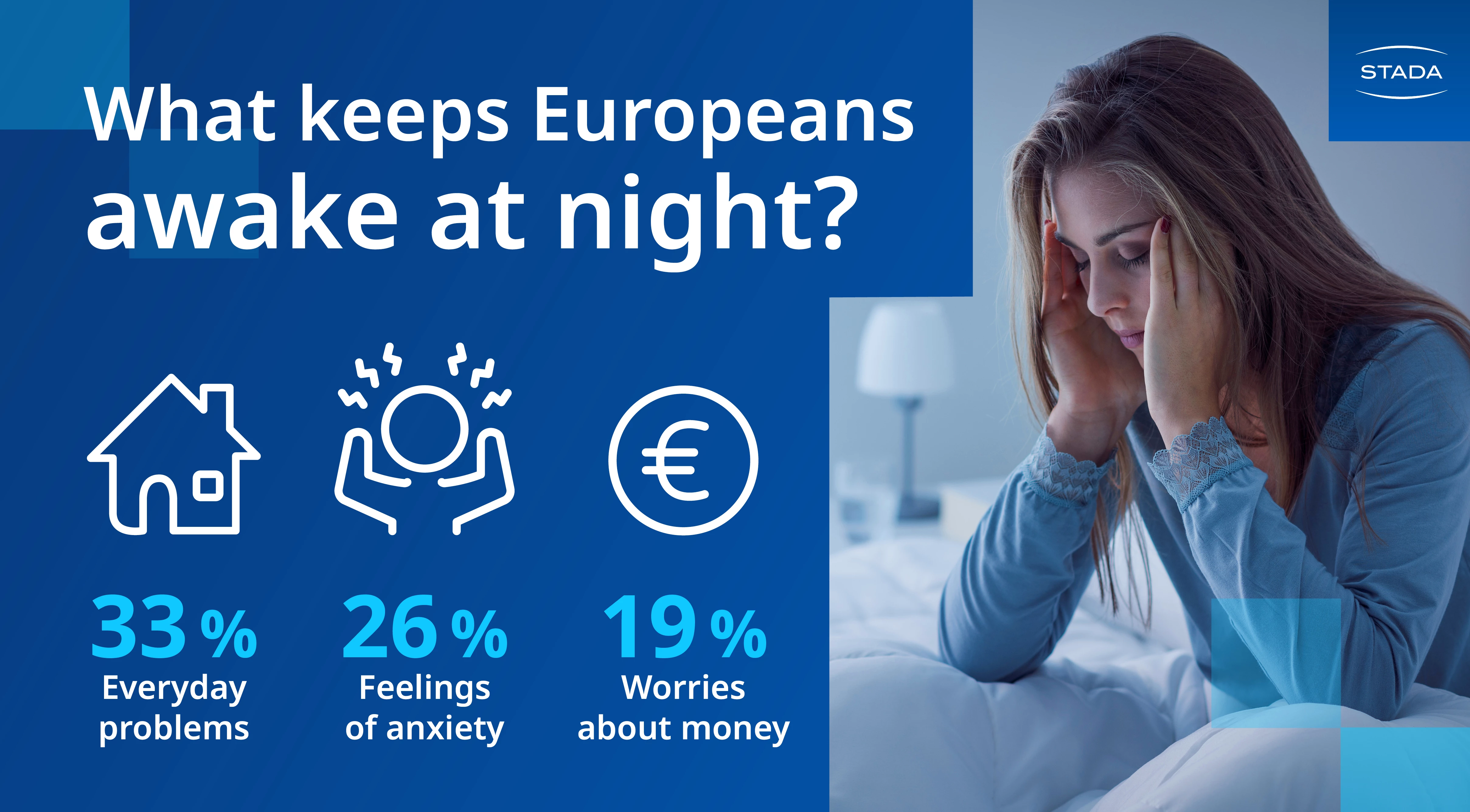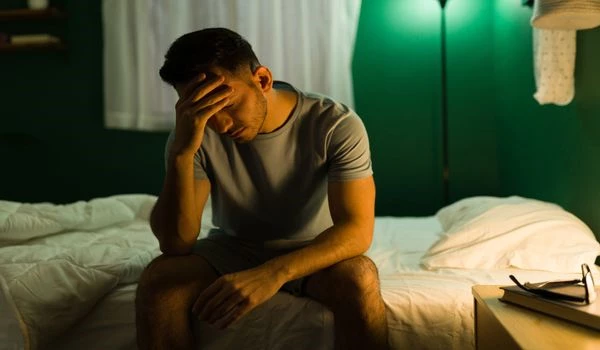Select your country
Websites worldwide
Select a country to go to the website of the respective STADA sales company.
Australia (1)
Austria (1)
Belarus (1)
Belgium (1)
Bosnia-Herzegovina (1)
Bulgaria (1)
China (1)
Croatia (1)
Czech Republic (2)
Denmark (1)
France (1)
Hungary (1)
Ireland (1)
Italy (1)
Montenegro (1)
Netherlands (2)
Poland (1)
Portugal (1)
Romania (1)
Serbia (1)
Slovakia (1)
Slovenia (1)
Spain (1)
Switzerland (1)
Thailand (1)
The Phillippines (1)
United Kingdom (3)
Vietnam (2)
Roughly one third of our lives is spent sleeping: this is the time for our brains to process the events of the day and for our bodies to regenerate and heal. A lack of sleep can have a severe and lasting impact on our overall health – especially when we fail to get enough rest over extended periods of time. With Europe’s mental health on the decline, it comes as no surprise that sleep quality has suffered considerably – but what is keeping them awake at night? And what are Europeans willing to do in order to improve their sleep quality?
Sleep disorders on the rise

A good night’s sleep can go a long way – especially when nerves are stretched thin. In accordance with rising levels of stress across the continent, it comes as no surprise that 35 percent of Europeans have been struggling to get a full night’s rest – in 2021, this was only true of 15 percent. Disturbed sleep in turn can add to and exacerbate existing overextension, stress and anxiety. An interesting correlation: People who report trouble sleeping are more likely to experience feelings of burnout (46 percent) than those with regular or good quality of sleep (26 percent). People in the UK, France (43 percent each) and Spain (42 percent) have the poorest quality of sleep. In comparison, people in the Netherlands (73 percent), Switzerland (72 percent), Kazakhstan and Austria (71 percent each) beat the 65 percent European average for high quality of sleep and slumber peacefully on a regular basis.
Still, only 22 percent of Europeans say they routinely get an uninterrupted night’s sleep without any disturbances, and the list of potential culprits robbing them of their rest is long. On average, one in three are plagued by worries about everyday problems, while almost half (47 percent) of the Polish population lose sleep over such issues. Women (38 percent) are also considerably more likely to lie awake thinking about daily dilemmas than men (29 percent). Feelings of anxiety come in second at 26 percent, with people in Italy (42 percent) being particularly affected. Financial worries cause about one in five (19 percent) Europeans to toss and turn, 16 percent complain about noise disruption from outside sources – and 13 percent about their partner’s snoring.

Reservations against sleeping aids prevail despite poorer quality of sleep
When it comes to addressing poor quality of sleep by means of medical sleeping aids, the continent is divided: 47 percent of Europeans are in favour of resorting to sleeping pills, with particular backing from Spain (59 percent), Italy (58 percent), both of whom also have the poorest quality of sleep, and Poland (57 percent). Among the “yays”, 26 percent say they would consider taking medical sleeping aids if they were prescribed by their GP. People in Portugal, Italy (33 percent each) and Spain (32 percent) value their doctor’s opinion especially highly. An additional 10 percent of Europeans might take sleeping pills if their pharmacist recommended them. The French go even farther: For 14 percent, sleeping pills are the only way of securing a good night’s sleep (European average 9 percent).
On the opposing end of the spectrum, 53 percent of Europeans are wary of taking medication to improve their quality of sleep, led by Kazakhstan (69 percent) and the Netherlands (61 percent) and Austria (60 percent), who sleep well enough as is, and the Czech Republic (61 percent). Reasons against the use of medical sleeping aids include a fear of addiction (19 percent), which is most pronounced in the Czech Republic (25 percent) and Kazakhstan (24 percent). The anticipation of unwanted side effects hinders 13 percent of Europeans from taking sleeping pills. The idea of shopping for such products makes people in Austria (22 percent) and Belgium (18 percent) feel especially uncomfortable (European average 12 percent).
CBD-based products most popular among European youth
Interest in sleeping aids that draw on the effects of CBD, a calming ingredient extracted from the leaves of the female hemp plant, strongly correlates with age. Among Europeans above the age of 55, only 42 percent say they can imagine availing themselves of sleeping aids that contain CBD. For 18 to 34-year-olds, this figure stands at 55 percent. As with regular sleeping aids, fear of addiction is the most common reason (13 percent) people remain wary of CBD-based products to improve their sleep.

STADA Health Report 2022: Representative online study by InSites Consulting on behalf of STADA.
Research time frame: March through April 2022.
Sample: Around 2,000 respondents each from Austria, Belgium, the Czech Republic, France, Germany, Italy, Kazakhstan, the Netherlands, Poland, Portugal, Romania, Serbia, Spain, Switzerland and the United Kingdom.







